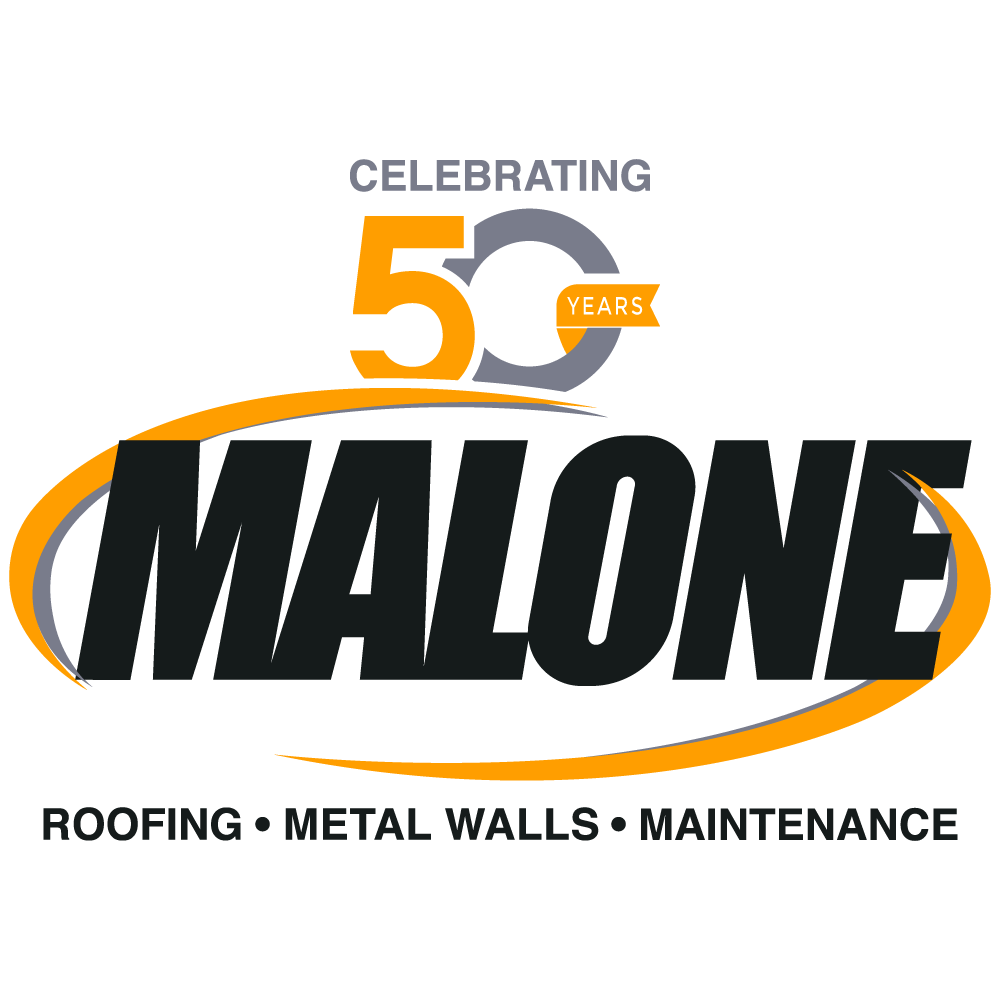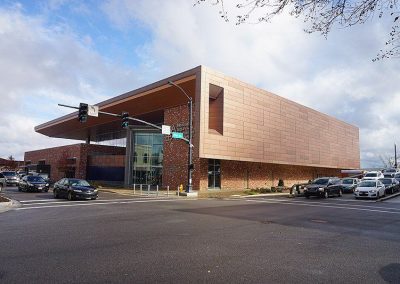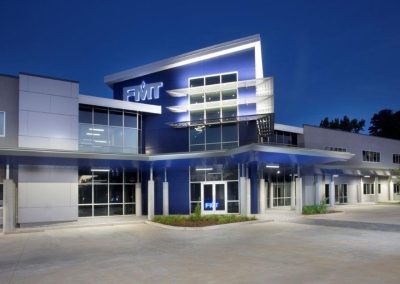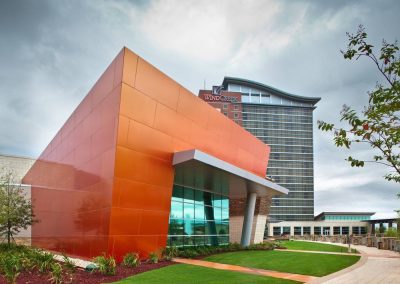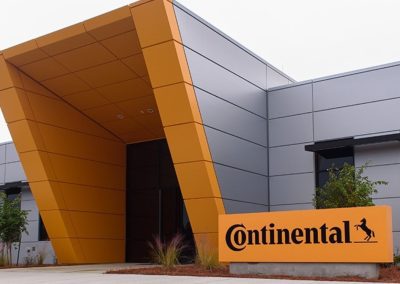Malone is The South’s Premier Fabricator And Installer Of Custom Metal Wall Panels
Malone’s Metal Wall Panel Division is an award-winning provider of comprehensive services from design to custom fabrication and ultimately installation of exterior metal wall panels. Our custom metal shop allows the freedom to develop and produce premium metal products that our clients want and need for their commercial properties.
We pride ourselves in our ability to offer end-to-end solutions for our metal wall panel clients, pledging open and transparent expectations and communication throughout the entire process. Here at Malone, our mission is to deliver the highest quality metal panel products and installations that exceed our customers needs.
Industrial Roofing VS. Commercial Roofing: What’s The Difference?
In the world of commercial roofing, Industrial roofing is a specialized field for only the highest quality and safest flat roofers. The standards, financial resources, bid bonding ability, and insurance requirements are higher than those of traditional commercial roofing. In addition to these factors, industrial roofers are usually required to be members of third-party organizations with strict qualifications and standards (i.e Avetta) in order to be considered for these types of specialty roofing projects.
Over the last 10+ years organizations such as ISNetWorld have helped Industrial manufacturers, food & beverage, chemical manufacturers, data centers, etc. to more efficiently review and certify workers and companies to perform work at their clients’ locations. This group ensures that all certified members have been properly trained to maintain the highest standards of quality workmanship, safety, quality control & oversight, as well as have the right experience and personnel to work around the unique challenges that are present when performing work at industrial and manufacturing customers’ locations. Between all of the barriers to entry and having to provide multiple credible references from other companies, a large company like Coca-Cola or Honda doesn’t have to worry about hiring the wrong contractor or having to worry about how the project will go because these industrial clients expect nothing less than perfection, meaning everything must go according to plan without fail!
Industrial Roofing Planning &
Installation Process
Planning for an industrial roofing project is much more involved than a typical commercial roofing project. Malone Roofing has the infrastructure and systems in place to properly maintain QC standards, safety oversight, and because of our company’s past experience performing large scale industrial roofing projects there’s not much that we haven’t seen or done.
Industrial projects typically require additional safety and quality control measures to ensure the protection of personnel and property: increased regulatory compliance, higher safety standards that exceed OSHA requirements, and reduced production. The lower production could be due to many factors however the most common we’ve seen are as follows:
1- Difficult access to the roof
2- Daily safety meetings before crews access the roof
3- Generally very busy roofs with lots of RTU’s, pipe penetrations, etc. to work around and other physical constraints.
This is mission critical because for example if you’re working on a chicken plant you don’t want a crew member accidentally cutting one of the ammonia lines. Because of these factors many of these industrial roofing projects require the need for full-time superintendents and safety managers to ensure the crews are able to effectively work within the project’s requirements in a safe manner. Navigating these challenges while maintaining high levels of quality during installation is what makes industrial roofers like Malone Roofing in a league of their own.
We have required resources and experience to handle all of these challenges with grace while still providing excellent customer service and keeping an open line of communication, which sets us apart from other commercial roofing contractors out there who don’t have the bandwidth needed to effectively manage an industrial roofing project.
Types of Industrial Roofing Systems
The most common roofing systems you’ll find in industrial environments are:- Built-up-roofing (BUR): This asphalt based roofing system consists of multiple layers (typically 4-5) of hot asphalt or cold process adhesive with rolls of fiberglass felt. These roofing systems typically last 30+ years and are well-known for being rugged and resistant to most membrane punctures because of the redundant layers of protection. It goes without being that this is not the most economical roofing option, but there’s a reason building owners have been installing these types of roofs for 100+ years. – Modified Bitumen: Also commonly known as “mod bit” or “rolled roofing” is an asphalt based roofing system that is usually only 2-layers. Because the asphalt in the roofing roll is “modified” with an additive the roofing membrane is more flexible to building movement and temperature changes (heat vs cold). One type is styrene-butadiene-styrene (SBS) which is modified with synthetic rubber and other is atactic polypropylene (APP) which is modified with a type of plastic. Because of the redundant layers of protection and multiple installation options these roofs are known for their greater waterproofing and weathering ability as well as resistance to punctures and foot traffic. – Single-Ply Roofing: There are multiple types of single-ply roofs available today which as the name implies it’s a single layer of roofing over the insulation. For industrial roofing we usually see high performing PVC and KEE membranes (i.e Fibertite or Sika Sarnafil) or specialty TPO roofing systems (i.e GAF Extreme TPO) on these types of projects. Majority of the time these facilities will opt for either adhered or rhinobond system applications for the benefit of higher wind uplift values.
Types of Industrial Roofing Customers
We have worked with a variety of customers. Some of the more well-known ones include:
– Food & Beverage
– Automobile manufacturing – Honda, Ford, and General Motors (GM) assembly plants
– Paper mills
– Chemical Manufacturing
– Healthcare & Pharmaceuticals
– Data Centers
– Wood processing facilities, such as lumber mills and plywood manufacturers
– Utilities
– Energy refining & processing
You may have noticed that we have worked with multiple industrial types of customers including Kohler Engines which is the 2nd largest manufacturing plant in Hattiesburg, MS. Back in 2020 we re-roofed 5,700 SQ’s (570,000 SF) with a new 60 mil TPO roofing system over their manufacturing areas, office, and administrative spaces.
Additional Challenges – When Servicing An Industrial Roof
One of the most challenging aspects of servicing an industrial roof is that it can be very dangerous. The type of work and safety requirements vary from industry to industry, so you need to be prepared for anything that could happen on the job site.
Some things you should know before starting any work:
-Is there an IBS call-in map? Some companies require that all workers receive training before working on their roofs.
-What is the minimum on-site show time required? This will vary from customer to customer and job site to job site, but it’s important to know so you’re not stuck waiting around for a long period of time. Sometimes it helps if you plan ahead and call the on-site contact so all parties are on the same page.
Service Coverage Area for Industrial Roof Replacement & Repairs
If you’re looking for an industrial roofer and have a question about our service coverage area, feel free to give us a call at 800-716-0977. We would be happy to discuss your project specific needs in more detail.
We have 6 fully-staffed offices throughout the greater Southeast US in Mississippi, Louisiana, Alabama, and Florida. In addition, we have the capabilities and personnel to perform out-of-state industrial roofing work throughout other states in the southeast. Our team of safety managers, estimators, project managers, superintendents, foreman, and roofing field technicians are experienced at installing and repairing all types of flat and pitched roofing systems made by all the major roof system manufacturers. No matter if it’s a TPO roof or a metal roof or modified bitumen we can handle it!
How to Choose the Right Contractor
When making the important decision about which industrial roofer is the right contractor for you, it’s important to consider a few things. First and foremost, who has the best reputation? What has their past track record on similar projects? What’s their safety record (EMR)? How responsive are they and do they do 24/7/365 emergency service? Do we have an open line of communication with their leadership team and are they known for completing projects on time?
Next, you might want to ask yourself what kind of specialized experience is required for our type of roofing project? Will this contractor be able to work around my manufacturing plant’s operations?
Another concern could be cost efficiency vs quality workmanship? What matters most to me in the industrial roofing contractor that I want to partner with?
Recently, Malone has received awards and commendations for projects at the Mississippi Civil Rights and History Museum, the Mississippi Arts and Entertainment Experience, and the Valero Meraux Refinery in Louisiana, to name a few. We’ve even been bold enough to facilitate projects in Starkville, MS and Oxford, MS, at Vaught-Hemingway Stadium and David-Wade Stadium, and Swayze Field respectively.
We have a saying around here, “If you don’t plan the project right, everything will be difficult from the beginning.” Malone makes sure every T is crossed and every I dotted, and we know this has contributed to our Metal Wall Division’s growth over the last 20 years.
Not many businesses in our region have the capabilities that Malone has. By managing all design and fabrication in-house, we’re able to minimize production time, customize for our clients, meet critical deadlines, and offer a “small company feel” to major commercial projects. We urge you to find a southern custom metal wall panel company that works as hard as we do, or cares as much as we do.
Benefits of Metal Wall Panels
For many reasons, metal wall panels are increasingly becoming one of the most popular ways to envelope commercial building projects. Metal panels of all types are often more durable and easy to install than more traditional materials, such as brick, and they tend to require less maintenance as well. Metal panels, especially insulated ones, have excellent thermal efficiency and deliver additional cost-savings to property owners in both summer and winter.
Our metal wall panels can improve the property’s structural integrity, adding strength and wind resistance, as well as improving resistance to fire and other weather-related problems.
An added benefit to metal wall panels is that they are also recyclable, which reduces their chance of ending up in a landfill one day. However, their increased durability compared to other building materials means they won’t be going anywhere for a long time.
Metal wall panels are an excellent long-term choice for interior and exterior facade construction. Talk with Malone’s Metal Wall Panel Division today for more information about your commercial project. Top-rated quality is our mission, and we can’t wait to show you what we’re made of.
Wall Panels Malone Offers
Aluminum Composite Material (ACM): These panels have a sleek, modern aesthetic that will enhance any building. With a lightweight and durable construction, Malone’s versatile ACM panels are custom-built to each order and painstakingly finished in our custom metal shop. There is little room for error with ACM panels, and Malone takes pride in fabricating these panels down within 1/16th of an inch.
Insulated Metal Panels: Quickly becoming one of the leading construction materials. thermal wall panels give a premium look to your building that instantly sets it apart. With strong R-value thermal insulation, these insulated panels help reduce energy consumption and costs, while boosting the visual appeal. Malone’s insulated metal panels deliver unwavering thermal efficiency and a classic appearance.
Aluminum Plate Panels: Steel panels are a classic looking panel that offers incredible strength, durability, and versatility. Constructed from solid aluminum sheets, they can be cut. bent. and curved to fit a design necessity. These panels can be post-painted, rather than prefinished. This provides the flexibility to match any color.. However, with proper insulation installed, this solution is still able to meet energy-efficiency goals.
Sinale Skin Metal Wall Panels: These panels consist of a single laver of metal that can be fabricated from various metals, including steel and aluminum. Single skin panels give a streamlined look that is easily customizable with a range of colors and finishes. Like other thin panels. Single skin is not an optimal solution for thermal insulation or soundproofing without proper supplementary materials
Fiber Cement Panels: If you want a versatile panel that has the appearance of natural materials such as wood and stone, but without the necessary maintenance, Fiber Cement panels may be for you. Fiber Cement panels are heavier than many other panels, so be sure to work with your commercial contractor to confirm they’re suitable for your project.
Wall Panel Design and Installation Process
The Malone Metal Wall Panel Division deploys a systematic and thorough approach for each metal wall panel project we undertake. Initially, we engage in detailed discussions with designers and stakeholders to define and outline desired aesthetics. Malone will assist by offering layout, efficiency, and structural performance recommendations.
Once the design is finalized, the designer will furnish production documentation that will serve as a basis for pricing. These comprehensive plans should include elevations, sections, and details that specify the products employed.
Next, we will submit our meticulously drafted shop drawings for approval. These drawings offer a complete view of panel layouts, attachments, and other fine detalls. Following approval, we procure the materials needed for the job in conjunction with project timelines.
Once the walls are framed and sheathed, openings are installed, and waterproofing is in place (Malone does not do building waterproofing), we then proceed to measure or laser scan the building. This step ensures all predecessor work, such as brick, stone, and window installations, is completed.
After measurement, we begin the fabrication process, which typically takes eight weeks to complete due to the exacting nature of custom wall panel development. In this phase, each panel is assigned a unique number on the fabrication and installation drawings for easy reference.
Finally, our panels are fabricated and delivered on-site. Complete with drawings and identification numbers, our installation crews outfit our client’s buildings with meticulous attention to detail and accuracy. Even the slightest variance from the plans can cause refabrication, so Malone makes sure to get it right the first time.
What Should I Look Out For When Choosing A Custom Metal Contractor/Fabricator?
In our multiple decades of experience designing, fabricating, and installing custom metal wall panels, Malone has learned the following truths regarding an excellent metal contractor.
Experience: A good installer will have a track record of successful installations. They should be able to provide references or show you examples of their previous work.
Communication: A good installer will clearly communicate the installation process, costs, and timeline. They should also be willing to answer all your questions and address your concerns.
Reviews and References: Check online reviews and ask for references. A reputable installer should have positive feedback from previous clients.
Licensing and Insurance: Ensure that the installer is properly licensed and insured to do the work. This protects you from liability in case of any accidents or damage.
Quality of Materials: A good installer will use high-quality materials and will be able to explain why these materials are the best choice for your project.
Warranties or Guarantees: A reputable installer will stand behind their work, offering warranties or guarantees on both the materials used and the installation.
Professionalism: Pay attention to the installer’s professionalism. They should be punctual, respectful, and maintain a clean work area.
Detailed Estimate: A good installer will provide a detailed estimate that includes all costs, timelines, and full scope of work. Beware of any installer who gives a vague or incomplete estimate
Call Malone to Get it Done Right
For commercial and residential properties, Malone has the experience, the staff, and the resources to get you in the dry faster and better than the rest!
Get the peace of mind you deserve. When you need service from a professional roofing company, call Malone!
